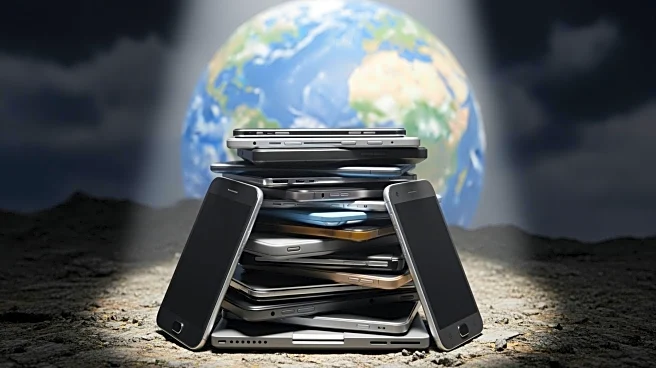What's Happening?
A recent report by the Basel Action Network (BAN) has revealed that several US brokers are involved in exporting electronic waste to developing countries, a trade estimated to be worth billions of dollars.
The report, titled 'Brokers of Shame: The New Tsunami of American e-Waste Exports to Asia,' highlights the ongoing export of e-waste from the US to countries that have banned such imports under the Basel Convention. The US remains the only industrialized nation not to ratify this convention, which aims to restrict hazardous waste trade between developed and less developed countries. BAN's findings, based on trade data, field observations, and GPS tracking, indicate that approximately 2,000 shipping containers filled with discarded US electronics are exported monthly to countries like Malaysia, Indonesia, Thailand, and the Philippines. These nations often lack the capacity to manage the waste safely, leading to environmental and health risks.
Why It's Important?
The export of e-waste from the US to developing countries poses significant environmental and health challenges. E-waste contains toxic metals such as lead, cadmium, and mercury, which can leach into the environment, causing pollution and health hazards. The rapid replacement of gadgets has led to a surge in global e-waste, which is growing five times faster than it is being recycled. In 2022, the world produced a record 62 million metric tons of e-waste, projected to rise to 82 million by 2030. The improper handling of e-waste in developing countries, where it is often dismantled by hand without protection, releases toxic fumes and poses risks to workers and communities. This situation underscores the need for stricter regulations and enforcement to prevent hazardous waste exports and promote sustainable recycling practices.
What's Next?
The findings of the BAN report may prompt calls for the US to ratify the Basel Convention and strengthen its regulations on e-waste exports. Environmental groups and policymakers could advocate for more stringent enforcement of existing laws to prevent the misdeclaration of hazardous waste as commodity materials. Additionally, there may be increased pressure on US businesses involved in e-waste exports to adopt more responsible practices and invest in domestic recycling solutions. International cooperation and support for developing countries to build capacity for safe e-waste management could also be a focus, aiming to reduce the environmental and health impacts of this growing issue.
Beyond the Headlines
The ongoing export of e-waste to developing countries raises ethical concerns about the responsibility of developed nations in managing their waste. It highlights the disparity in waste management capabilities between industrialized and developing countries, where the latter often bear the brunt of environmental degradation. The issue also points to the need for a global approach to e-waste management, emphasizing the importance of sustainable production and consumption patterns. Long-term solutions may involve redesigning electronics to be more durable and easier to recycle, reducing the overall volume of waste generated.










